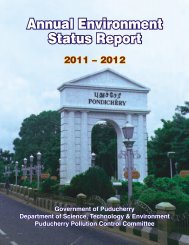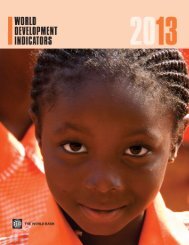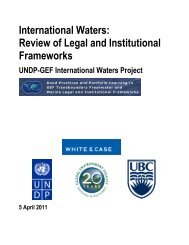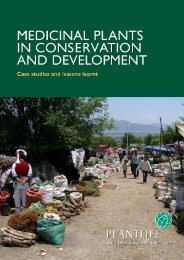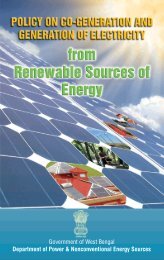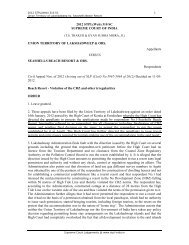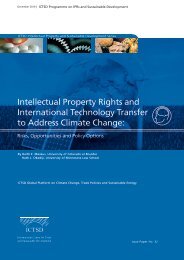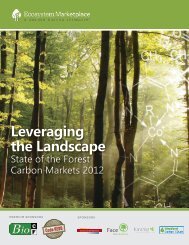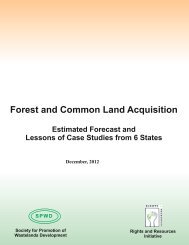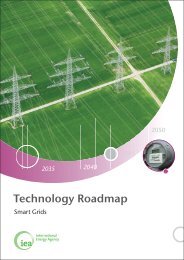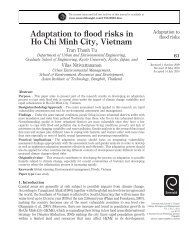DEFORESTATION AROUND THE WORLD - India Environment Portal
DEFORESTATION AROUND THE WORLD - India Environment Portal
DEFORESTATION AROUND THE WORLD - India Environment Portal
Create successful ePaper yourself
Turn your PDF publications into a flip-book with our unique Google optimized e-Paper software.
Agroforestry Systems and Local<br />
Institutional Development for Preventing Deforestation in Chiapas, Mexico 345<br />
In Marques de Comillas collective organization and decisions can impact broad and<br />
decisively on the territory in the short term, while in Chilón and Salto de Agua decisions<br />
taken by individuals or groups may be slower than collective decisions. Future studies on<br />
social resilience on both types of patterns should be of great importance. The lesson gained<br />
in this experience is that public programs must consider community priorities based on an<br />
integral regional vision, environmental education, strengthening of local capabilities and<br />
organisation. As a whole, public priorities may be a better appropriation and adaptation of<br />
programs in a new model of territorial development by considering institutional<br />
arrangements (Merino and Warnholtz, 2005). Farmers are the leading experts regarding<br />
their context and livelihood conditions and may or may not adopt and adapt programs that<br />
involve a territorial vision. The intense participation of communities may allow better<br />
monitoring, especially when these programs are integrated into their own communitymanagement<br />
plans (Franzel and Scherr, 2002).<br />
Territorial participatory planning of agroforestry and restoration systems, in addition to the<br />
institutional development have demonstrated their capacity to benefit environment,<br />
farmer’s livelihoods and social capital, through their contribution to increase productivity,<br />
complexity, diversity, economic value, organization capacities and knowledge, which as a<br />
whole may contribute to avoid deforestation (Alburquerque, 2002; Bray, 2008; Swiderska et<br />
al., 2008). However, other products, service, process and management innovations are<br />
required to have a broader menu of options for farming systems and livelihoods to ensure<br />
the permanence of forest systems in a competitive context. Some of the needs to be resolved<br />
in order to conceive this process as a territorial development are: the best practices to<br />
achieve food self-sufficiency, development of market chains, education, training,<br />
infrastructure, financial support, policy arrangements and skills of competitiveness for<br />
production systems (Alburquerque, 2002; Ruiz de Oña et al., 2011). An integration of an<br />
agroecological matrix which enables agricultural production and natural resource<br />
conservation and a new political vision may help facilitate social and environmental<br />
synergies in rural areas (Perfecto and Vandermeer, 2010)<br />
Although the experience run by the project Scolel te’ in Marqués de Comillas is not precisely<br />
REDD+, may offer a set of lessons learned about the conditions required for a good<br />
management for reducing deforestation. Some elements which need to be considered in order<br />
to contribute to the design of PES programs are the following: 1) technology adaptation, 2)<br />
ordering of land use with a territorial development vision, 3) broad participation of all<br />
stakeholders, 4) institutional development at local, regional levels and, 5) involvement in<br />
networks to launch processes of governance for the management of an adequate public policy<br />
of PES. Although these systems may contribute to avoiding deforestation, their potential to<br />
become part of REDD programs need to be better discussed since the relationship among<br />
markets and actors’ rights and duties, in addition to the uncertainty regarding the factors<br />
influencing effectiveness on deforestation is unclear (Coad et al., 2008).<br />
In Chiapas, a process of institutional development around the issue of PES is emerging. In the<br />
last years groups working on ecosystem services (State Group of Ecosystem Services, GESE by<br />
its acronyms in Spanish) and deforestation and degradation (REDD) have matured in the state<br />
of Chiapas; representatives of the “Camara de Diputados y Senadores del Estado de Chiapas”<br />
(State House of Representatives and Senate) have approved the Law for Mitigation and<br />
Adaptation to Climate Change in the State; meanwhile, a group of research institutions and<br />
organizations of the civil society carry out an effort of monitoring, reporting and verification



